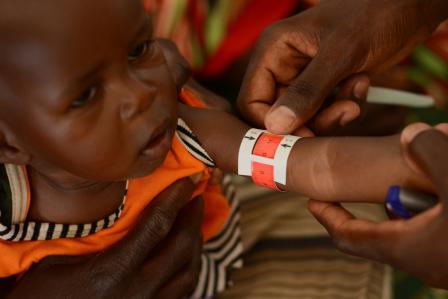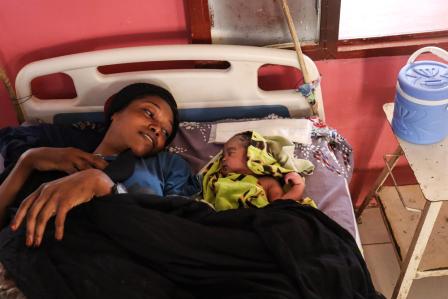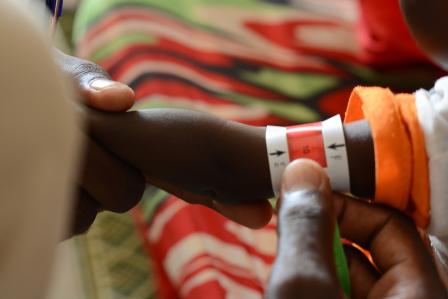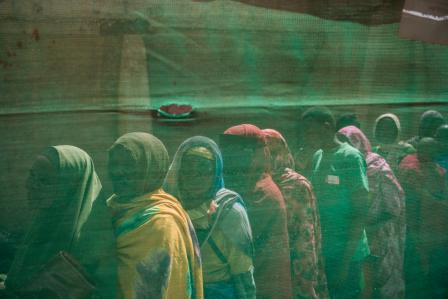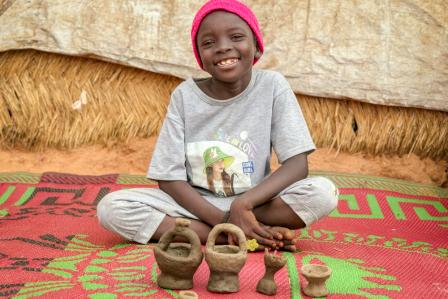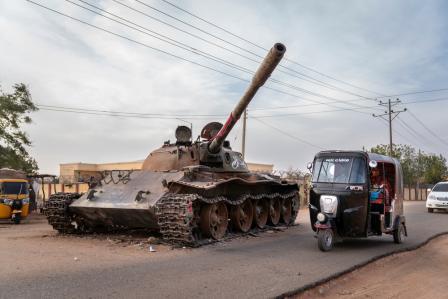Sudan: Catastrophic malnutrition crisis in Zamzam camp amidst escalating violence in North Darfur
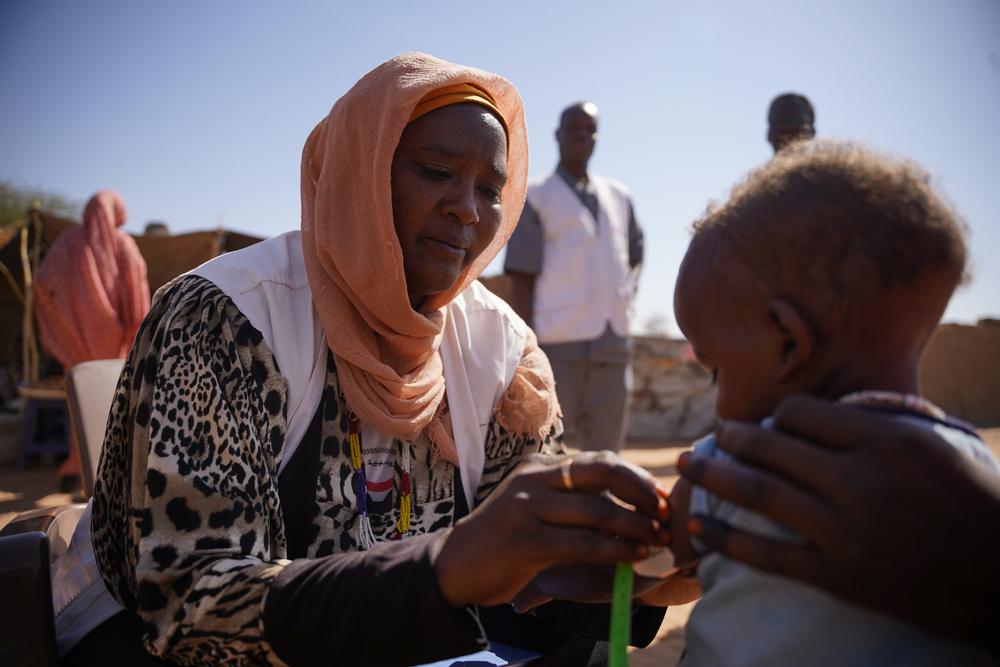
Doctors Without Borders is running a clinic in Zamzam camp that hosting more than 300,000 internally displaced people. Our teams are offering Ambulatory Therapeutic Feeding services. Sudan, February 2024. © Mohamed Zakaria
- Doctors Without Borders is scaling-up its response to the major malnutrition crisis in Zamzam camp, where the situation is becoming even more critical by opening a second health clinic, enrolled over 11,000 children in its nutrition programme and opened a 35-bed field hospital to treat those in most critical need of treatment.
- The situation can only be kept from worsening into a catastrophe with a significant increase in the humanitarian response. Urgently needed are reliable food distributions that offer ample rations.
- Doctors Without Borders urges protection for civilians, healthcare facilities, and staff to deliver vital aid promptly to at-risk populations.
In response to the escalating fighting in North Darfur, Doctors Without Borders / Médecins Sans Frontières (MSF) has treated over 100 war wounded patients – including 11 children, many with gunshot wounds – at South Hospital, El Fasher, over the past two weeks, but is simultaneously scaling-up its response to the major malnutrition crisis in Zamzam camp, where the situation is becoming even more critical. As it does so, Doctors Without Borders is calling on the warring parties to ensure the protection of civilians, health care structures and staff, so that vital assistance for the tens of thousands of people whose lives are at-risk can be effectively provided before it is too late.
Following the devastating results of a rapid nutrition and mortality assessment conducted by Doctors Without Borders in early January, a mass screening of more than 63,000 children under-five, as well as pregnant and breastfeeding women, was conducted in March and April and confirms that there is a catastrophic and life-threatening malnutrition crisis in Zamzam camp, North Darfur. Despite having called urgently for support in February when the results of the rapid assessment were published, nearly three months later, Doctors Without Borders remains almost the only international aid agency responding to this enormous crisis – and, as a result, one of the very few able to respond to mass casualty events in El Fasher.
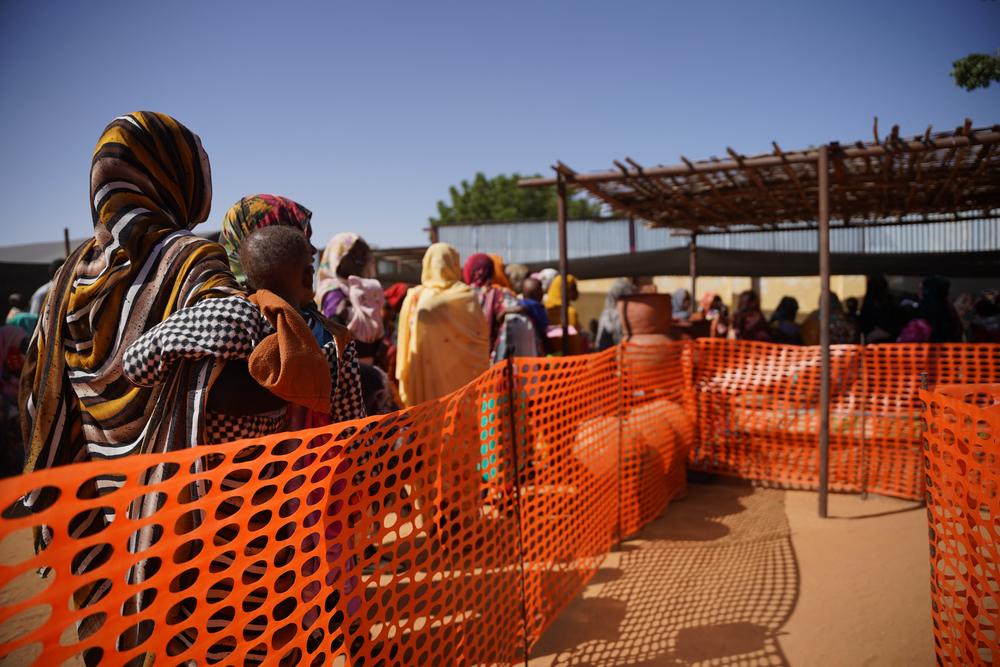
Mothers and children wait in a queue at Doctors Without Borders clinic in Zamzam camp. Sudan, February 2024. © Mohamed Zakaria
Of the 46,000+ children who were screened, a staggering 30 per cent were found to be suffering from acute malnutrition – with eight per cent having severe acute malnutrition (SAM). Similar figures were found among the 16,000+ pregnant and breastfeeding women who were screened: 33 per cent were acutely malnourished, with 10 per cent having SAM. For both population groups these figures are double the emergency threshold of 15 per cent, indicating that there is a massive, life-threatening emergency in Zamzam camp.
“In Zamzam camp, there is an acute disaster on a catastrophic scale,” says Claire Nicolet, head of Doctors Without Borders' emergency response in Sudan. “The situation is critical, the level of suffering is immense, but despite this being known about for nearly three months, nowhere near enough has been done to help those who are struggling to survive. With the fighting escalating, we are extremely worried that it will make it even more difficult for the much-needed international support we have been calling for to arrive. And, with the lean season approaching, we are also worried that there is going to be a rapid deterioration in this already drastic malnutrition crisis over the coming weeks.”
The lives of hundreds of thousands of people were already in jeopardy – and now, with the current fighting, even more are at-risk. There is an urgent need for the humanitarian response to be rapidly scaled-up so that this malnutrition crisis can be pulled back from the brink, and for this to happen, it is vital that the warring parties take action to enable safe humanitarian access and the protection of civilians.Claire Nicolet
Doctors Without Borders has already scaled-up its response by opening a second health clinic, enrolling over 11,000 children in its nutrition programme, and opening a 35-bed field hospital to treat the most critical cases. Currently, all beds are fully occupied and among the patients are 19 children with severe acute malnutrition and three with suspected measles. Doctors Without Borders is planning to start a vaccination campaign against measles and to expand its activities to provide support for pregnant women. However, this is not enough to meet the needs. Additional health care is not being provided in the camp and it is vital that it is restored as a matter of urgency.
“There is no doubt that there are enormous challenges when it comes to providing humanitarian assistance in Sudan, but it is possible to do it,” says Nicolet.
Restrictions on humanitarian access – including deliberate obstructions on the delivery of aid by the warring parties – have significantly hampered the ability of aid agencies to scale-up the response. Insecurity has as well. But the situation is too critical for these issues to continue being used as excuses. The UN and the wider humanitarian community must do more to negotiate access for UN agencies and international NGOs to come and assist with the response in Zamzam.Claire Nicolet
The conditions people in Zamzam are living in are deplorable. There have been no official food distributions in the camp since May 2023. Although a handful of UN trucks reached El Fasher two weeks ago, nothing reached Zamzam until Monday 29 April. On this date, community leaders were handed food that they were then expected to distribute among the population.
However, even before the start of the war, people in the camp received very little support. Food rations were much lower than international standards, there was insufficient clean water and there were only two other health clinics in the vast camp before Doctors Without Borders opened its first one in 2022, both of which are now barely functional.
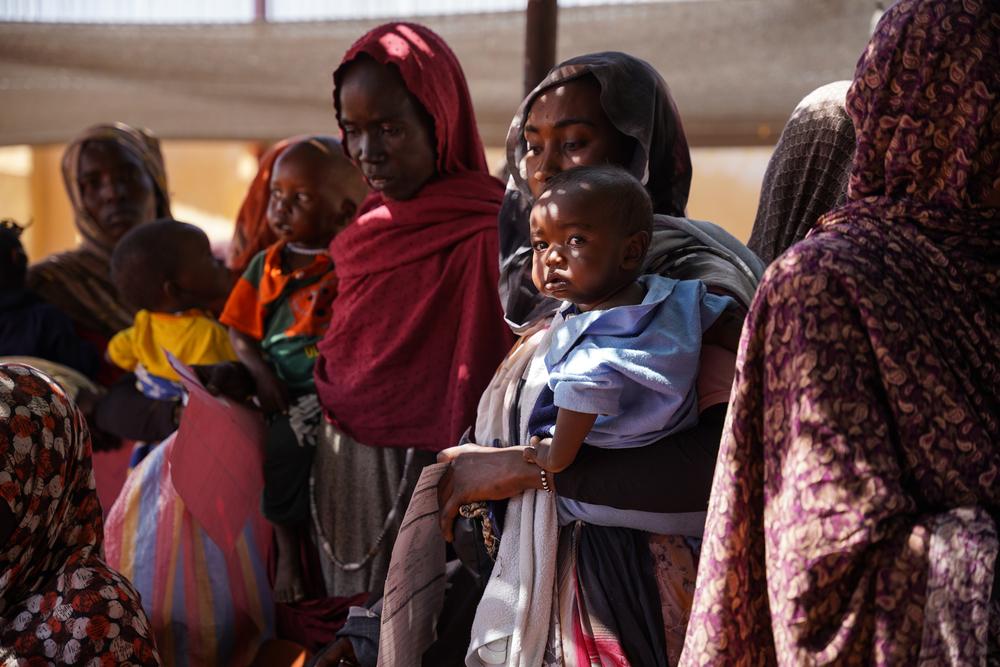
A rapid nutrition and mortality assessment carried out by Doctors Without Borders in Zamzam camp in January 2024 reveals that a deadly situation has unfolded over the past nine months. Sudan, 2024. © Mohamed Zakaria
“The situation is dire for all residents of the camp and over the past year, it has significantly deteriorated. For the thousands of people who have become newly displaced from Nyala, Tawila and other locations where intense fighting has taken place, the situation is especially bad. Many arrived in Zamzam with nothing and are living in overcrowded schools with no access to food or water. Everyone in Zamzam camp needs support, but the recent arrivals are especially vulnerable. With the violence escalating in North Darfur once again, additional people are becoming displaced meaning that there may soon be even more competition for the already very limited resources in the camp.”
Reliable distributions of food, that provide people with sufficient rations, are the only thing that will prevent the situation from falling even further into catastrophe. With the rainy season approaching, and no tarmac on the roads, it will become difficult for aid trucks to reach Zamzam, making the swift delivery of aid even more imperative. Despite being aware of the severity of the situation, and despite famine alerts coming from UN agencies themselves, the UN are doing far too little to prevent the malnutrition crisis in Zamzam from falling further into catastrophe.


